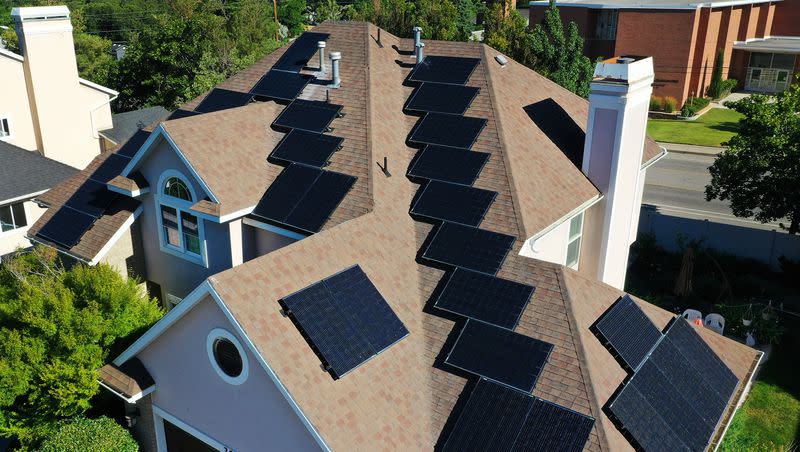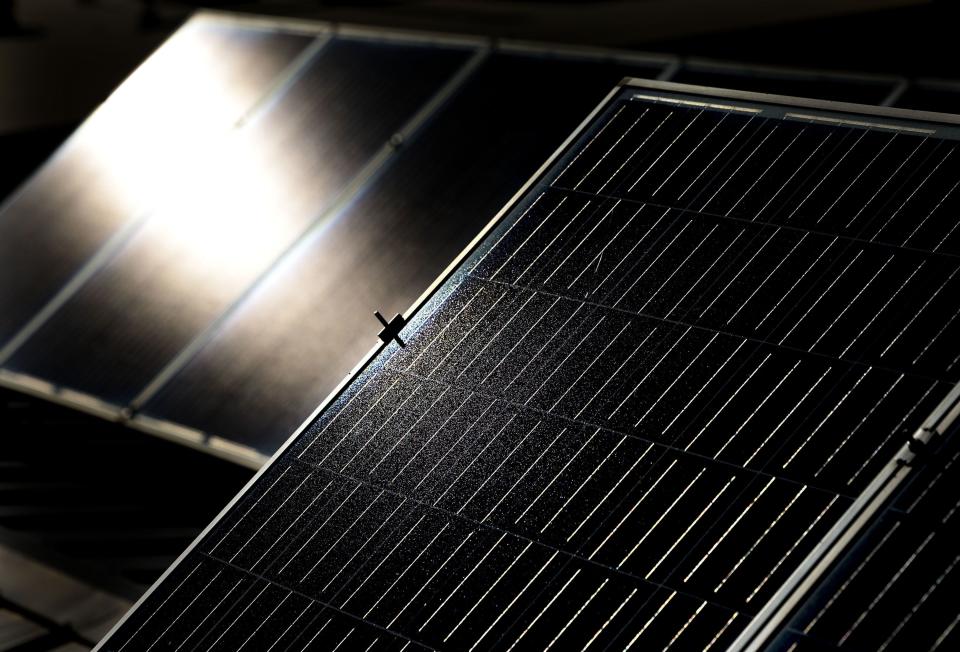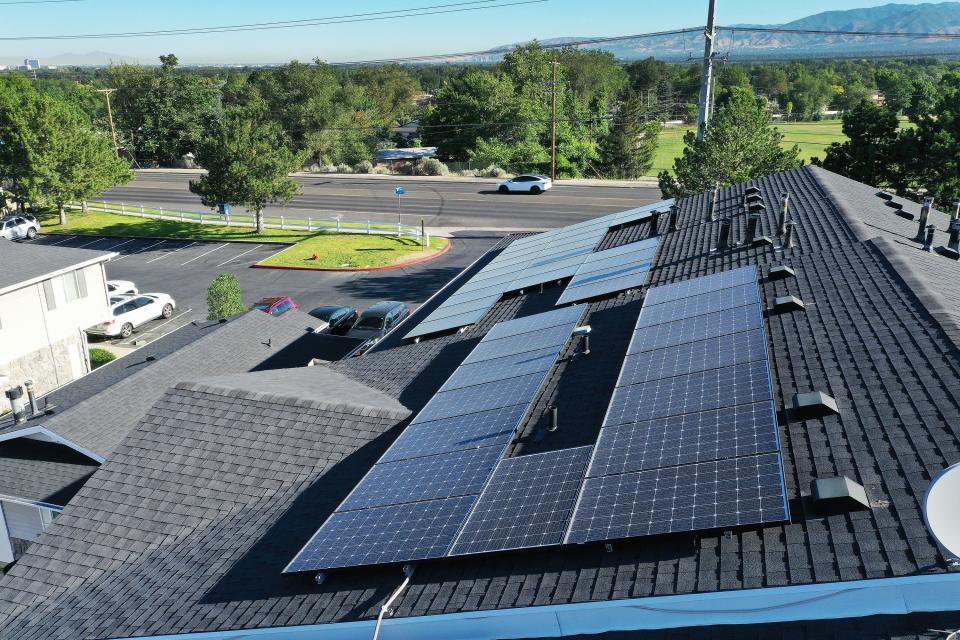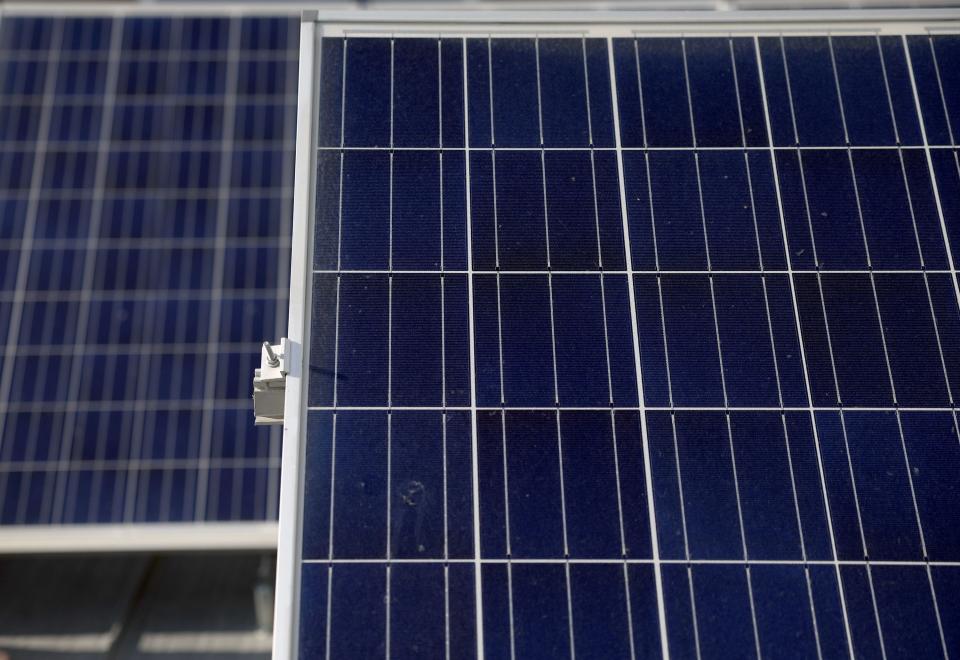‘Solar boom’ heats up fraud complaints against Utah solar companies

The following story was reported by The Utah Investigative Journalism Project in partnership with the Deseret News.
Several Utah-based solar companies and executives were accused of “deceptive and fraudulent” business practices in Minnesota in spring 2022, and while their Minnesota operations have ended, others are still in business across the country.
The solar industry is booming, thanks in part to salespeople going door to door offering or promising energy savings and a way to do something good for the environment.
That’s exactly what Caitlin Owens, a health administrator who lives in North Carolina, thought in summer 2019 when she listened to a sales pitch from a door-to-door salesman from Brio Solar LLC, a Utah-based solar panel installation company.
Brio was among the companies that Minnesota Attorney General Keith Ellison accused of “deceptive and misleading tactics,” according to a complaint filed April 25, 2022. Along with Brio, Bello Solar Energy LLC, Avolta Power Inc. and Sunny Solar Utah LLC are named in Ellison’s civil lawsuit against the Utah companies; three of their executives, Jared Fager, Michael Kaelin and Alan Whitaker; and three lending services that partnered with the solar companies to finance consumer loans.
“The solar defendants use deceptive and misleading tactics to gain customers’ trust, gain access to their homes, and sell them solar panels that cost far more than the average Minnesota solar PV system,” the 59-page complaint filed in the lawsuit reads.
None of the companies, executives, or their attorneys listed in the lawsuit responded to multiple requests through email or phone calls for comment.
According to a statement from Ellison’s office, the complaint alleges those companies cost Minnesota consumers “anywhere from $20,000 to over $55,000” by using “deceptive and fraudulent methods” in their sales tactics and contracts.
“(Brio) did the assessment,” Owens said of her North Carolina solar panel purchase in an interview. “Then showed me essentially what I would be approved for with a loan and compared it to what my current power bill was. Essentially, I would be saving money by paying a loan payment instead of my energy bill.”
With a 25-year warranty and assurances that Brio would be there to service and repair her panels, Owens said she thought it would be a long-term cost saving opportunity that would also allow her to do something good for the environment.
“I was like, I don’t know why I would say no,” Owens said.
The installation process went smoothly, and Owens didn’t have any problems until October 2022 when she saw her panels had stopped generating energy for a month.
At first, she attributed it to the weather. Then November came and went and the panels still didn’t generate any energy, and she knew there was a problem.
“I needed to call Brio,” Owens said. “Come to find out, Brio doesn’t exist anymore. I went online, and I couldn’t find a website.”

Bringing the heat
The Minnesota Attorney General’s Office said it received many complaints reporting deceptive sales practices, some of which were similar to Owens’ situation.
“The Attorney General’s Office has received dozens of complaints and sworn statements about these companies from Minnesota consumers,” an Aug. 26, 2022, press release reads. “The complaints sparked an investigation in which the office found that since these companies were started, they have falsely represented that their salespeople work for, or are partners with, local utilities despite cease-and-desist letters and other warnings to consumers from utilities across the country.”
Again, none of the executives or their lawyers accused in the lawsuit nor their former or current companies responded to multiple requests to comment. However, the documentation filed with the court on behalf of the executives and companies denies all of the allegations in the initial complaint filed in the lawsuit.
A majority of the court filing is spent describing some of the methods that were taught to the companies’ salespeople and the experiences consumers reported having with them.
“They describe sales as ‘going to war,’ and train their sales team to use aggressive and misleading tactics to sell solar panels to consumers,” the complaint reads. It goes on to quote Kaelin, one of the solar companies’ executives named in the lawsuit, telling representatives in a sales training, “We have to be willing to beat people up a bit, you know, give them a little grief.”
Some sales representatives who went door to door for the companies would wear fluorescent utility vests and represent themselves as being energy consultants with local utility companies, such as Xcel, which handles much of Minnesota’s power grid, according to the complaint.
The complaint also describes a salesman in a training video saying, “‘We wear these vests to try to help with image’” and describes his efforts to “mislead” homeowners into believing that he is not there to sell them anything by talking to them as if he is “‘there to dig a ditch in (their) yard.’”
One report made by an 81-year-old woman, identified as M.D. in the complaint, claimed that a representative from Avolta Power, Inc, called her and identified themselves as working with Xcel. It wasn’t until after she signed a contract with Avolta for a $33,000 solar panel installation and tried to get out of it that she found out the representative didn’t work with Xcel.
Another Brio customer, a 28-year-old Marine veteran identified as J.P., also reported that a sales representative told him it had partnered with Xcel to “create greener energy, save money and ease the strain on Xcel’s energy grid.” After taking out a loan for $38,320, J.P discovered Brio was not partnered with Xcel. The complaint states that he will pay more than $16,500 in interest on that loan over the next 25 years.
There are 21 other reports from consumers about similar incidents listed in the complaint. Court documents reveal there are 96 individual Minnesota consumers who are prepared to testify on behalf of the state in addition to the hundreds of filed complaints made to Minnesota leaders.
The lawsuit goes on to quote Fager, another of the three executives included in the suit, allegedly demonstrating a sales script for sales representatives, using their home state of Utah as an example:
“So, the reason they have me out here today is the state of Utah has been mandating that here in the state we start shutting down power plants and what that’s doing is that’s causing, because there’s less energy, that’s causing an increase in our costs for energy,” Fager read.
Fager and Kaelin dubbed those strategies “pain cycles,” the complaint said, and sales representatives were to use them to create more incentive for consumers to buy into their systems.
“‘It’s like you just punched them in the face and then you’re like, here’s an ice pack, right?’ Kaelin describes during one of his sales trainings,” the complaint reads.
Using those high-pressure sales tactics and falsely presenting themselves as working with utility companies, the salespeople would persuade homeowners to sign paperwork presented as quotes or estimates, when they were actually a contract to install solar panels, according to the Minnesota complaint.
The solar companies and executives are also accused of charging nearly double the average price of a residential solar system in Minnesota, asking consumers to pay $5,000 to $6,000 per kilowatt produced compared to the $3,750 average, according to an affidavit filed by the Minnesota attorney general. Then, the complaint continues, once panels were installed, they were not connected to the grid, were not completed or did not work as promised.
That’s similar to the situation Owens found herself dealing with in North Carolina. When she began to unravel her solar troubles, she also found that Brio had charged her $1,500 to connect her inverter with the manufacturing company, SolarEdge, though the company does not charge monitoring services.

A tangled solar web
The solar companies named in the complaint have been able to continue operating under new names through a “doing business as” filing after appearing to close. These filings made with the business’ state of origin, often referred to as DBAs, declare that a company is using a name other than the name it initially registered with, and allow the company to use either name.
Three of the companies listed in the Minnesota lawsuit — Brio Energy LLC, Bello Solar Energy LLC and Avolta Power Inc. — are nearly identical companies with the same three or four executives managing the same company under a new name. The lawsuit alleges that the frequent name changes cause customer confusion. Further, the dates of the name changes correlate to various public warnings and legal actions due to “deceptive” sales tactics cited in the complaint.
In 2015, two different companies using similar names registered with the state of Utah within seven months: Brio Energy LLC and Brio Solar Energy LLC. Brio Energy LLC is one of the corporations listed in the Minnesota lawsuit. The company’s original certificate of organization lists Jared Fager as the managing member. He is also named individually in the lawsuit. Brio Solar Energy is also in the lawsuit, but under a different name.
Brio Energy also has two registered “doing business as” names: Pure Solar Energy and Clean Energy Educators. Brio Solar Energy LLC’s certificate also lists Fager as the agent and member of the company alongside Coomer Enterprises, which, in its documentation, lists Adam Coomer as its manager.
Brio Solar Energy did not keep its name long. In August 2017, it changed its name to Total Solar Solutions LLC. Those name changes were preceded by the electric utility of Austin, Texas,
Austin Energy, sending a cease-and-desist letter to Brio Energy, alleging that Brio had made “fraudulent and misleading statements.”
In August 2020, Total Solar Solutions then changed its name to Bello Solar Energy LLC, which is named in the lawsuit. Coomer is not listed as a party in the lawsuit.
Prior to that name change, Blue Ridge Electric, a North Carolina and South Carolina utility, issued a notice to customers in February 2020 that they had no retail partnership with any companies, despite members calling to confirm that after conversations with Brio representatives.
Avolta Power Inc. is the only solar company in the lawsuit that has not gone by any other name that is on file. According to court documentation filed by Fager, Avolta is the “umbrella” corporation that now oversees Brio. Avolta is incorporated in the state of Delaware, though it lists a Utah address — the same one listed for the company that housed Bello Solar Energy — with Coomer as the president and agent of the company on its Utah business documentation.
Ultimately, that means that the same executives and corporations named in the Minnesota lawsuit and in complaints across the country have continued to rebrand over the years without customer knowledge.
Seven months after the Minnesota lawsuit was filed, a consent judgment, which is an agreed upon settlement that does not imply liability, was entered in November 2022 for Brio Energy LLC, Bello Solar Energy LLC, and Avolta Power, Inc., requiring that three mandates be met:
The completion of all projects in the state.
A refund for cancellation fees collected from consumers, totaling $34,801.95.
A $100,000 payment to the state of Minnesota, split across the three companies.
Fager also accepted a consent judgment in November 2022 that ordered him to personally pay the state $71,315.63.
Kaelin, vice president of sales at Brio and Avolta, was accused in the Minnesota lawsuit of creating and directing the companies’ misleading sales practices in Minnesota and for the company at large. He accepted a consent judgment on March 27 that released him from liability in the lawsuit and did not require him to pay any fines as it was discovered he had not personally trained individuals in the Minnesota company.
The Utah Department of Commerce lists Fager as the director at Avolta Power Inc. Additionally, there were no filings made with the state of Utah to remove Fager’s information from Brio Energy or Bello Solar Energy until January 2023.
Even now, the three companies and names are considered “active” and licensed to do business in Utah, according to the commerce department’s database.
Avolta is the only one that appears to still be operating, as there are no websites or information available on Brio, Bello, Pure Solar Energy, Total Solar Solutions or Clean Energy Educators when searched.
Fager has since created a new solar company based in Utah: Elite Solar Group, LLC. This LLC also has a DBA for Nova Solar, which is what the business uses as its main identifier to consumers. The filed applications for both Elite Solar and Nova Solar list the same address that was listed as Brio Energy’s address.
The complaint from the Minnesota Attorney General’s Office notes that Kaelin and Fager are “co-founders” of the additional company, but Fager denies in his affidavit that Kaelin is involved in its founding. Despite the filing, Kaelin’s LinkedIn page lists him as both “CRO” and “Co-Founder” of Nova Solar, though business documentation did not list Kaelin as a member or manager for the company.
Sunny Solar Utah, LLC, helmed by Alan Whitaker, who is also named as an individual in the lawsuit, has a DBA filed for the name Sunny Renewable Energy. The company was still operational at the time of the lawsuit, but failed to renew its Utah business license by its expiration on Feb. 14, and its website domain has lapsed.
On March 3, Whitaker and Sunny Solar Utah also accepted a consent judgment requiring the company and Whitaker to pay a combined $20,000.
By May 19, 2023, the Minnesota Attorney General announced that he had reached a settlement and obtained separate judgments against all 10 defendants in the lawsuit with no implication of liability. The total settlement was more than $310,000. All solar projects for these consumers must be completed by June 27 or be canceled without penalties.

Complaints
In the past five years, the Utah Division of Consumer Protection has received 83 complaints about solar companies — a volume that “is probably a little more than other industries,” communications director Zach Whitney said.
Thirteen of those complaints resulted in the consumer protection agency taking administrative action against a company. All have closed their doors.
According to court documents, Evelar Solar was a Lehi company found to be in violation of several Utah codes for taking deposits, never installing a solar system and not refunding deposits. The Division of Consumer Protection handed down a cease-and-desist order and a $5,000 fine.
Altaray Solar LLC closed its doors after being cited for 24 violations of failing to provide products after taking payments and 45 violations of stating it had approval from the customer for services when it did not. That resulted in a $50,000 fine from the Consumer Protection Division.
Legend Solar LLC was found to have not fulfilled at least 100 agreements with customers and not refunding them when requested. That led to a $500,000 fine from Consumer Protection.
The Consumer Protection Division provides detailed resources on its website that consumers can use when looking to hire someone or when a door-to-door salesperson comes knocking.
The website also lists tips and best practices in 13 different categories of consumer resources, including home improvement. Because contractors are required to have business licenses in Utah, the Division of Occupational and Professional Licensing has a license verification page where customers can verify a business license’s validity.
The Consumer Protection Division also recommends ensuring a price estimate, summary of the work, start date and estimated completion date. It should also include any payment schedules or credit terms.
Any consumer who feels they’ve been mistreated by a company can file a complaint at consumerprotection.utah.gov/consumers/ or on a federal level at reportfraud.ftc.gov.
Once a complaint is filed, the Consumer Protection Division investigates to see if any statutes have been violated.
“Anytime anyone feels that they have been taken advantage of or something was misrepresented, please submit a complaint,” Whitney said. “We rely on people telling us when there are bad actors in any industry.”
Britta Clark with the Better Business Bureau of Utah also says locals should be vigilant.
“As solar becomes more popular we are seeing in the industry a sort of a boom, especially in states like Utah that have climates that are sunny and hot,” Clark said.
According to the Bureau of Labor Statistics, there are 1,476 established solar businesses in the United States, and 50 in Utah. The problem, Clark says, isn’t with the solar industry as a whole, but that it often comes from door-to-door salespeople who are out on their own and aren’t accountable for how they do their sales.
She warns about salespeople who might distract you while you are reading the contract, or who hand you an iPad and scroll down to the bottom for you to sign without letting you look over the contract details.
Clark also stresses that consumers need to do their homework and be prepared for aggressive salespeople. Even if one salesperson gets busted or loses their job it won’t necessarily stop bad practices in the industry.
“In Utah especially,” she said, “you can be fired by one door-to-door company in the morning and hired by another one in the same afternoon.”

